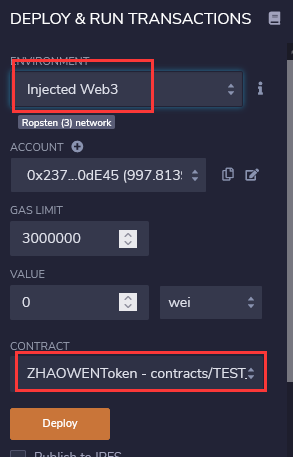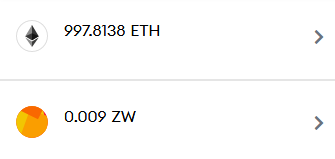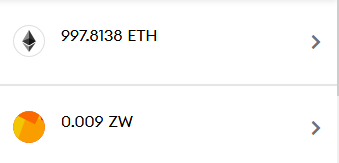注意:本文只供个人学习,不具有且不允许有任何商业价值,所有虚拟币均为测试币。
0x01 前言
本次实验是在以太坊上搭建一个智能合约,并且发行一种ERC20代币。实验目的为了解智能合约提供的部分功能。
0x02 部署智能合约
1. 部署
在GitHub上找了一个开源项目:https://github.com/OpenZeppelin/openzeppelin-contracts
将里面的ERC20.sol丢到remix里面运行:
// SPDX-License-Identifier: MIT pragma solidity ^0.8.0; import "./IERC20.sol"; import "./IERC20Metadata.sol"; import "./Context.sol"; /** * @dev Implementation of the {IERC20} interface. * * This implementation is agnostic to the way tokens are created. This means * that a supply mechanism has to be added in a derived contract using {_mint}. * For a generic mechanism see {ERC20PresetMinterPauser}. * * TIP: For a detailed writeup see our guide * https://forum.zeppelin.solutions/t/how-to-implement-erc20-supply-mechanisms/226[How * to implement supply mechanisms]. * * We have followed general OpenZeppelin guidelines: functions revert instead * of returning `false` on failure. This behavior is nonetheless conventional * and does not conflict with the expectations of ERC20 applications. * * Additionally, an {Approval} event is emitted on calls to {transferFrom}. * This allows applications to reconstruct the allowance for all accounts just * by listening to said events. Other implementations of the EIP may not emit * these events, as it isn't required by the specification. * * Finally, the non-standard {decreaseAllowance} and {increaseAllowance} * functions have been added to mitigate the well-known issues around setting * allowances. See {IERC20-approve}. */ contract ERC20 is Context, IERC20, IERC20Metadata { mapping(address => uint256) private _balances; mapping(address => mapping(address => uint256)) private _allowances; //授权 uint256 private _totalSupply; //代币总量 string public _name; //代币名称 简称 string public _symbol; /** * @dev Sets the values for {name} and {symbol}. * * The default value of {decimals} is 18. To select a different value for * {decimals} you should overload it. * * All two of these values are immutable: they can only be set once during * construction. */ // constructor(string memory name_, string memory symbol_) { // _name = name_; // _symbol = symbol_; // } /** * @dev Returns the name of the token. */ function name() public view virtual override returns (string memory) { return _name; } /** * @dev Returns the symbol of the token, usually a shorter version of the * name. */ function symbol() public view virtual override returns (string memory) { return _symbol; } /** * @dev Returns the number of decimals used to get its user representation. * For example, if `decimals` equals `2`, a balance of `505` tokens should * be displayed to a user as `5,05` (`505 / 10 ** 2`). * * Tokens usually opt for a value of 18, imitating the relationship between * Ether and Wei. This is the value {ERC20} uses, unless this function is * overridden; * * NOTE: This information is only used for _display_ purposes: it in * no way affects any of the arithmetic of the contract, including * {IERC20-balanceOf} and {IERC20-transfer}. */ function decimals() public view virtual override returns (uint8) { return 18;//这里是定义的精度,在发行的时候没有小数点这个概念,因此100...(18个)0000为1 } /** * @dev See {IERC20-totalSupply}. */ function totalSupply() public view virtual override returns (uint256) { return _totalSupply; } /** * @dev See {IERC20-balanceOf}. */ function balanceOf(address account) public view virtual override returns (uint256) { return _balances[account]; } /** * @dev See {IERC20-transfer}. * * Requirements: * * - `recipient` cannot be the zero address. * - the caller must have a balance of at least `amount`. */ function transfer(address recipient, uint256 amount) public virtual override returns (bool) { _transfer(_msgSender(), recipient, amount); return true; } /** * @dev See {IERC20-allowance}. */ function allowance(address owner, address spender) public view virtual override returns (uint256) { return _allowances[owner][spender]; } /** * @dev See {IERC20-approve}. * * Requirements: * * - `spender` cannot be the zero address. */ function approve(address spender, uint256 amount) public virtual override returns (bool) { _approve(_msgSender(), spender, amount); return true; } /** * @dev See {IERC20-transferFrom}. * * Emits an {Approval} event indicating the updated allowance. This is not * required by the EIP. See the note at the beginning of {ERC20}. * * Requirements: * * - `sender` and `recipient` cannot be the zero address. * - `sender` must have a balance of at least `amount`. * - the caller must have allowance for ``sender``'s tokens of at least * `amount`. */ function transferFrom( address sender, address recipient, uint256 amount ) public virtual override returns (bool) { _transfer(sender, recipient, amount); uint256 currentAllowance = _allowances[sender][_msgSender()]; require(currentAllowance >= amount, "ERC20: transfer amount exceeds allowance"); unchecked { _approve(sender, _msgSender(), currentAllowance - amount); } return true; } /** * @dev Atomically increases the allowance granted to `spender` by the caller. * * This is an alternative to {approve} that can be used as a mitigation for * problems described in {IERC20-approve}. * * Emits an {Approval} event indicating the updated allowance. * * Requirements: * * - `spender` cannot be the zero address. */ function increaseAllowance(address spender, uint256 addedValue) public virtual returns (bool) { _approve(_msgSender(), spender, _allowances[_msgSender()][spender] + addedValue); return true; } /** * @dev Atomically decreases the allowance granted to `spender` by the caller. * * This is an alternative to {approve} that can be used as a mitigation for * problems described in {IERC20-approve}. * * Emits an {Approval} event indicating the updated allowance. * * Requirements: * * - `spender` cannot be the zero address. * - `spender` must have allowance for the caller of at least * `subtractedValue`. */ function decreaseAllowance(address spender, uint256 subtractedValue) public virtual returns (bool) { uint256 currentAllowance = _allowances[_msgSender()][spender]; require(currentAllowance >= subtractedValue, "ERC20: decreased allowance below zero"); unchecked { _approve(_msgSender(), spender, currentAllowance - subtractedValue); } return true; } /** * @dev Moves `amount` of tokens from `sender` to `recipient`. * * This internal function is equivalent to {transfer}, and can be used to * e.g. implement automatic token fees, slashing mechanisms, etc. * * Emits a {Transfer} event. * * Requirements: * * - `sender` cannot be the zero address. * - `recipient` cannot be the zero address. * - `sender` must have a balance of at least `amount`. */ function _transfer( address sender, address recipient, uint256 amount ) internal virtual { require(sender != address(0), "ERC20: transfer from the zero address"); require(recipient != address(0), "ERC20: transfer to the zero address"); _beforeTokenTransfer(sender, recipient, amount); uint256 senderBalance = _balances[sender]; require(senderBalance >= amount, "ERC20: transfer amount exceeds balance"); unchecked { _balances[sender] = senderBalance - amount; } _balances[recipient] += amount; emit Transfer(sender, recipient, amount); _afterTokenTransfer(sender, recipient, amount); } /** @dev Creates `amount` tokens and assigns them to `account`, increasing * the total supply. * * Emits a {Transfer} event with `from` set to the zero address. * * Requirements: * * - `account` cannot be the zero address. */ function _mint(address account, uint256 amount) internal virtual { require(account != address(0), "ERC20: mint to the zero address"); _beforeTokenTransfer(address(0), account, amount); _totalSupply += amount; _balances[account] += amount; emit Transfer(address(0), account, amount); _afterTokenTransfer(address(0), account, amount); } /** * @dev Destroys `amount` tokens from `account`, reducing the * total supply. * * Emits a {Transfer} event with `to` set to the zero address. * * Requirements: * * - `account` cannot be the zero address. * - `account` must have at least `amount` tokens. */ function _burn(address account, uint256 amount) internal virtual { require(account != address(0), "ERC20: burn from the zero address"); _beforeTokenTransfer(account, address(0), amount); uint256 accountBalance = _balances[account]; require(accountBalance >= amount, "ERC20: burn amount exceeds balance"); unchecked { _balances[account] = accountBalance - amount; } _totalSupply -= amount; emit Transfer(account, address(0), amount); _afterTokenTransfer(account, address(0), amount); } /** * @dev Sets `amount` as the allowance of `spender` over the `owner` s tokens. * * This internal function is equivalent to `approve`, and can be used to * e.g. set automatic allowances for certain subsystems, etc. * * Emits an {Approval} event. * * Requirements: * * - `owner` cannot be the zero address. * - `spender` cannot be the zero address. */ function _approve( address owner, address spender, uint256 amount ) internal virtual { require(owner != address(0), "ERC20: approve from the zero address"); require(spender != address(0), "ERC20: approve to the zero address"); _allowances[owner][spender] = amount; emit Approval(owner, spender, amount); } /** * @dev Hook that is called before any transfer of tokens. This includes * minting and burning. * * Calling conditions: * * - when `from` and `to` are both non-zero, `amount` of ``from``'s tokens * will be transferred to `to`. * - when `from` is zero, `amount` tokens will be minted for `to`. * - when `to` is zero, `amount` of ``from``'s tokens will be burned. * - `from` and `to` are never both zero. * * To learn more about hooks, head to xref:ROOT:extending-contracts.adoc#using-hooks[Using Hooks]. */ function _beforeTokenTransfer( address from, address to, uint256 amount ) internal virtual {} /** * @dev Hook that is called after any transfer of tokens. This includes * minting and burning. * * Calling conditions: * * - when `from` and `to` are both non-zero, `amount` of ``from``'s tokens * has been transferred to `to`. * - when `from` is zero, `amount` tokens have been minted for `to`. * - when `to` is zero, `amount` of ``from``'s tokens have been burned. * - `from` and `to` are never both zero. * * To learn more about hooks, head to xref:ROOT:extending-contracts.adoc#using-hooks[Using Hooks]. */ function _afterTokenTransfer( address from, address to, uint256 amount ) internal virtual {} } contract ZHAOWENToken is ERC20{ //这里的is可以理解为“是” constructor () public{
//使用public就是面向内部和外部用户,注意几种关键字的区别 _name = "ZHAOWEN" _symbol = "ZW"; _mint(msg.sender, 10000000000000000); } }
这里的注意事项是:
1) 最开始的import库,也要放到remix里面,记得改路径;
2)开源项目上没有说到代币的发行量,我们这里需要定义代币的发行量。
2.导入所需要库的源码
context.sol的源码:
// SPDX-License-Identifier: MIT pragma solidity ^0.8.0; /* * @dev Provides information about the current execution context, including the * sender of the transaction and its data. While these are generally available * via msg.sender and msg.data, they should not be accessed in such a direct * manner, since when dealing with meta-transactions the account sending and * paying for execution may not be the actual sender (as far as an application * is concerned). * * This contract is only required for intermediate, library-like contracts. */ abstract contract Context { function _msgSender() internal view virtual returns (address) { return msg.sender; } function _msgData() internal view virtual returns (bytes calldata) { return msg.data; } }
IERC20Metadata.sol的源码
// SPDX-License-Identifier: MIT pragma solidity ^0.8.0; import "./IERC20.sol"; /** * @dev Interface for the optional metadata functions from the ERC20 standard. * * _Available since v4.1._ */ interface IERC20Metadata is IERC20 { /** * @dev Returns the name of the token. */ function name() external view returns (string memory); /** * @dev Returns the symbol of the token. */ function symbol() external view returns (string memory); /** * @dev Returns the decimals places of the token. */ function decimals() external view returns (uint8); }
IERC20.sol的源码
如果ERC20.sol报错,报错信息为找不到IERC20.sol的位置,就直接改文件名为IERC20.sol就行了。
// SPDX-License-Identifier: MIT pragma solidity ^0.8.0; /** * @dev Interface of the ERC20 standard as defined in the EIP. */ interface IERC20 { /** * @dev Returns the amount of tokens in existence. */ function totalSupply() external view returns (uint256); /** * @dev Returns the amount of tokens owned by `account`. */ function balanceOf(address account) external view returns (uint256); /** * @dev Moves `amount` tokens from the caller's account to `recipient`. * * Returns a boolean value indicating whether the operation succeeded. * * Emits a {Transfer} event. */ function transfer(address recipient, uint256 amount) external returns (bool); /** * @dev Returns the remaining number of tokens that `spender` will be * allowed to spend on behalf of `owner` through {transferFrom}. This is * zero by default. * * This value changes when {approve} or {transferFrom} are called. */ function allowance(address owner, address spender) external view returns (uint256); /** * @dev Sets `amount` as the allowance of `spender` over the caller's tokens. * * Returns a boolean value indicating whether the operation succeeded. * * IMPORTANT: Beware that changing an allowance with this method brings the risk * that someone may use both the old and the new allowance by unfortunate * transaction ordering. One possible solution to mitigate this race * condition is to first reduce the spender's allowance to 0 and set the * desired value afterwards: * https://github.com/ethereum/EIPs/issues/20#issuecomment-263524729 * * Emits an {Approval} event. */ function approve(address spender, uint256 amount) external returns (bool); /** * @dev Moves `amount` tokens from `sender` to `recipient` using the * allowance mechanism. `amount` is then deducted from the caller's * allowance. * * Returns a boolean value indicating whether the operation succeeded. * * Emits a {Transfer} event. */ function transferFrom( address sender, address recipient, uint256 amount ) external returns (bool); /** * @dev Emitted when `value` tokens are moved from one account (`from`) to * another (`to`). * * Note that `value` may be zero. */ event Transfer(address indexed from, address indexed to, uint256 value); /** * @dev Emitted when the allowance of a `spender` for an `owner` is set by * a call to {approve}. `value` is the new allowance. */ event Approval(address indexed owner, address indexed spender, uint256 value); }
3.智能合约的代码调试编译OK以后,准备deploy
 环境选择web3,合约选择自己刚刚创建的,然后deploy。然后meta mask就能连上了
环境选择web3,合约选择自己刚刚创建的,然后deploy。然后meta mask就能连上了

连上meta mask--选择活动,查看智能合约部署状态--部署完毕,复制合约地址---metamask中添加代币----显示代币数量---完毕
0x03 功能测试
1.再创建一个账号,测试账户1和从账户2可以互通了


证明创建成功。接下来我们测试一下remix里面的功能。

下面的功能也差不多。。。